Analyzing Key Mental Health Issues: Depression & Dementia in Australia
VerifiedAdded on 2023/04/17
|8
|1676
|143
Essay
AI Summary
This essay identifies depression and dementia as two of the most significant mental health issues facing Australia today. It elaborates on the characteristics, causes, and impacts of both conditions, drawing on various studies and statistics to highlight their prevalence and burden on individuals and the healthcare system. The essay discusses depression, characterized by persistent low mood and loss of interest, and dementia, an umbrella term for cognitive decline, detailing their respective symptoms and risk factors. It further proposes intervention strategies, including pharmacological and non-pharmacological treatments for depression, and psychological therapies and support services for dementia. The essay concludes by emphasizing the need for appropriate interventions to lower the rates of these mental health issues and improve the quality of life for affected individuals and their caregivers. Desklib provides access to this essay and many other solved assignments for students.
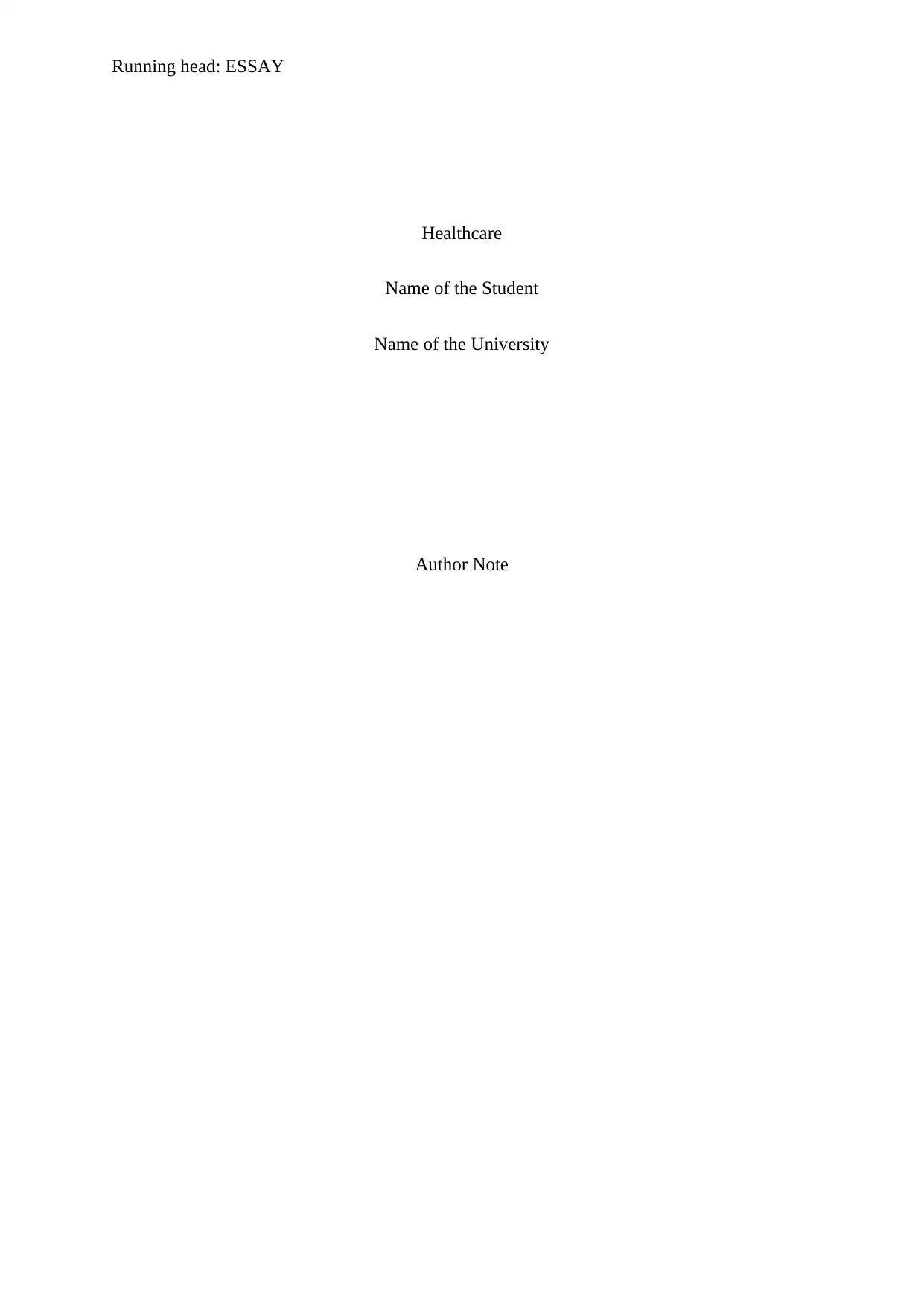
Running head: ESSAY
Healthcare
Name of the Student
Name of the University
Author Note
Healthcare
Name of the Student
Name of the University
Author Note
Paraphrase This Document
Need a fresh take? Get an instant paraphrase of this document with our AI Paraphraser
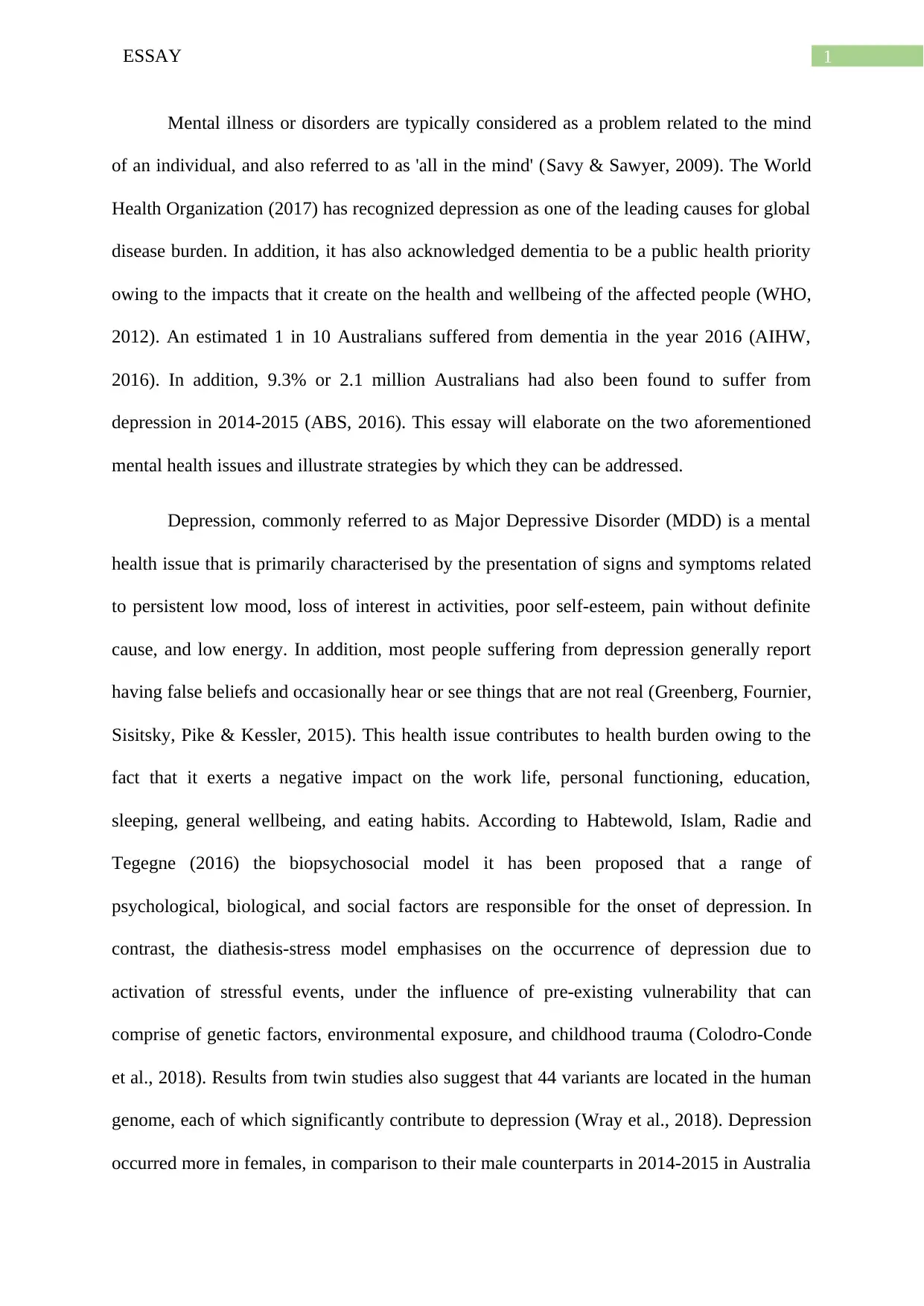
1ESSAY
Mental illness or disorders are typically considered as a problem related to the mind
of an individual, and also referred to as 'all in the mind' (Savy & Sawyer, 2009). The World
Health Organization (2017) has recognized depression as one of the leading causes for global
disease burden. In addition, it has also acknowledged dementia to be a public health priority
owing to the impacts that it create on the health and wellbeing of the affected people (WHO,
2012). An estimated 1 in 10 Australians suffered from dementia in the year 2016 (AIHW,
2016). In addition, 9.3% or 2.1 million Australians had also been found to suffer from
depression in 2014-2015 (ABS, 2016). This essay will elaborate on the two aforementioned
mental health issues and illustrate strategies by which they can be addressed.
Depression, commonly referred to as Major Depressive Disorder (MDD) is a mental
health issue that is primarily characterised by the presentation of signs and symptoms related
to persistent low mood, loss of interest in activities, poor self-esteem, pain without definite
cause, and low energy. In addition, most people suffering from depression generally report
having false beliefs and occasionally hear or see things that are not real (Greenberg, Fournier,
Sisitsky, Pike & Kessler, 2015). This health issue contributes to health burden owing to the
fact that it exerts a negative impact on the work life, personal functioning, education,
sleeping, general wellbeing, and eating habits. According to Habtewold, Islam, Radie and
Tegegne (2016) the biopsychosocial model it has been proposed that a range of
psychological, biological, and social factors are responsible for the onset of depression. In
contrast, the diathesis-stress model emphasises on the occurrence of depression due to
activation of stressful events, under the influence of pre-existing vulnerability that can
comprise of genetic factors, environmental exposure, and childhood trauma (Colodro-Conde
et al., 2018). Results from twin studies also suggest that 44 variants are located in the human
genome, each of which significantly contribute to depression (Wray et al., 2018). Depression
occurred more in females, in comparison to their male counterparts in 2014-2015 in Australia
Mental illness or disorders are typically considered as a problem related to the mind
of an individual, and also referred to as 'all in the mind' (Savy & Sawyer, 2009). The World
Health Organization (2017) has recognized depression as one of the leading causes for global
disease burden. In addition, it has also acknowledged dementia to be a public health priority
owing to the impacts that it create on the health and wellbeing of the affected people (WHO,
2012). An estimated 1 in 10 Australians suffered from dementia in the year 2016 (AIHW,
2016). In addition, 9.3% or 2.1 million Australians had also been found to suffer from
depression in 2014-2015 (ABS, 2016). This essay will elaborate on the two aforementioned
mental health issues and illustrate strategies by which they can be addressed.
Depression, commonly referred to as Major Depressive Disorder (MDD) is a mental
health issue that is primarily characterised by the presentation of signs and symptoms related
to persistent low mood, loss of interest in activities, poor self-esteem, pain without definite
cause, and low energy. In addition, most people suffering from depression generally report
having false beliefs and occasionally hear or see things that are not real (Greenberg, Fournier,
Sisitsky, Pike & Kessler, 2015). This health issue contributes to health burden owing to the
fact that it exerts a negative impact on the work life, personal functioning, education,
sleeping, general wellbeing, and eating habits. According to Habtewold, Islam, Radie and
Tegegne (2016) the biopsychosocial model it has been proposed that a range of
psychological, biological, and social factors are responsible for the onset of depression. In
contrast, the diathesis-stress model emphasises on the occurrence of depression due to
activation of stressful events, under the influence of pre-existing vulnerability that can
comprise of genetic factors, environmental exposure, and childhood trauma (Colodro-Conde
et al., 2018). Results from twin studies also suggest that 44 variants are located in the human
genome, each of which significantly contribute to depression (Wray et al., 2018). Depression
occurred more in females, in comparison to their male counterparts in 2014-2015 in Australia
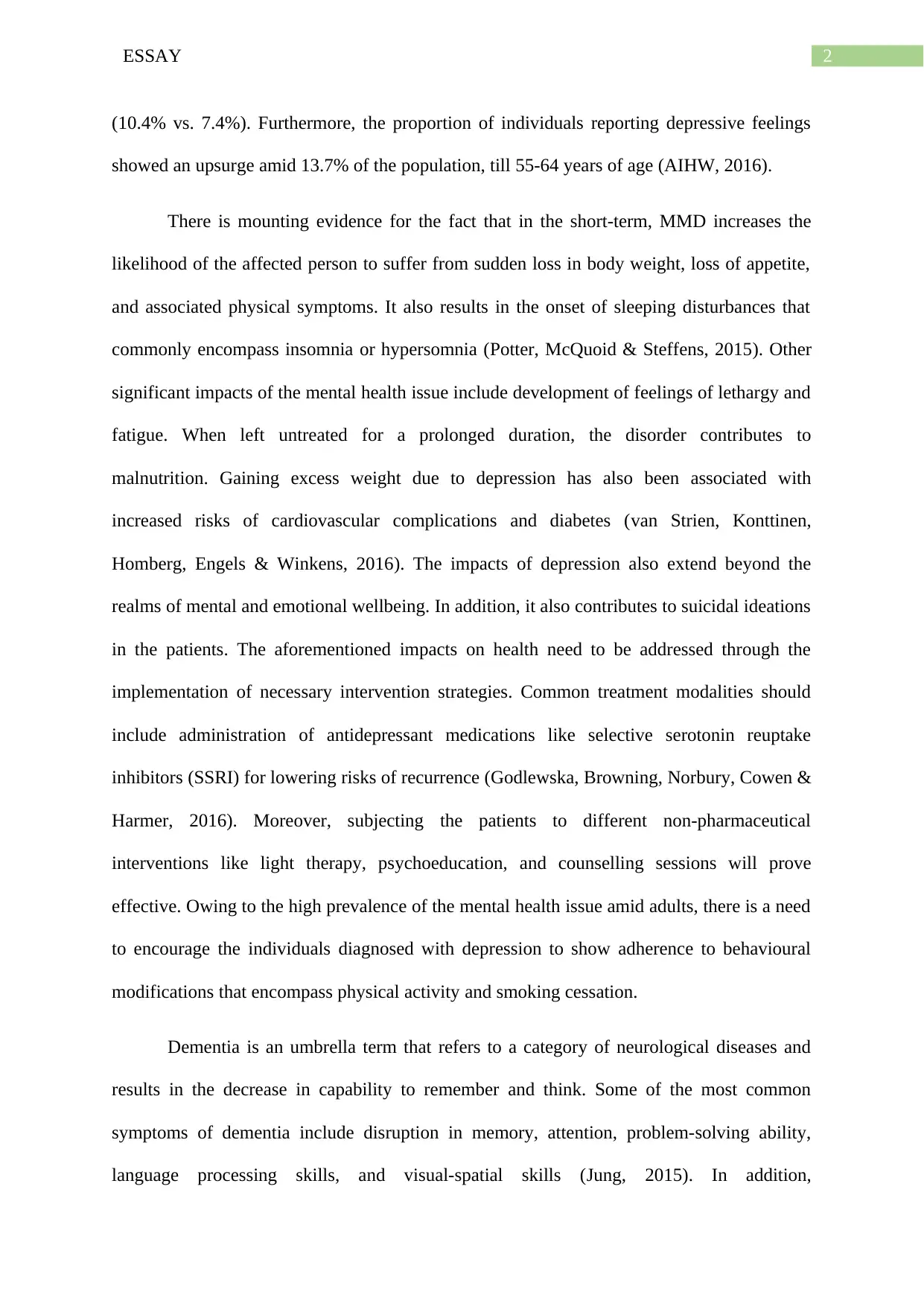
2ESSAY
(10.4% vs. 7.4%). Furthermore, the proportion of individuals reporting depressive feelings
showed an upsurge amid 13.7% of the population, till 55-64 years of age (AIHW, 2016).
There is mounting evidence for the fact that in the short-term, MMD increases the
likelihood of the affected person to suffer from sudden loss in body weight, loss of appetite,
and associated physical symptoms. It also results in the onset of sleeping disturbances that
commonly encompass insomnia or hypersomnia (Potter, McQuoid & Steffens, 2015). Other
significant impacts of the mental health issue include development of feelings of lethargy and
fatigue. When left untreated for a prolonged duration, the disorder contributes to
malnutrition. Gaining excess weight due to depression has also been associated with
increased risks of cardiovascular complications and diabetes (van Strien, Konttinen,
Homberg, Engels & Winkens, 2016). The impacts of depression also extend beyond the
realms of mental and emotional wellbeing. In addition, it also contributes to suicidal ideations
in the patients. The aforementioned impacts on health need to be addressed through the
implementation of necessary intervention strategies. Common treatment modalities should
include administration of antidepressant medications like selective serotonin reuptake
inhibitors (SSRI) for lowering risks of recurrence (Godlewska, Browning, Norbury, Cowen &
Harmer, 2016). Moreover, subjecting the patients to different non-pharmaceutical
interventions like light therapy, psychoeducation, and counselling sessions will prove
effective. Owing to the high prevalence of the mental health issue amid adults, there is a need
to encourage the individuals diagnosed with depression to show adherence to behavioural
modifications that encompass physical activity and smoking cessation.
Dementia is an umbrella term that refers to a category of neurological diseases and
results in the decrease in capability to remember and think. Some of the most common
symptoms of dementia include disruption in memory, attention, problem-solving ability,
language processing skills, and visual-spatial skills (Jung, 2015). In addition,
(10.4% vs. 7.4%). Furthermore, the proportion of individuals reporting depressive feelings
showed an upsurge amid 13.7% of the population, till 55-64 years of age (AIHW, 2016).
There is mounting evidence for the fact that in the short-term, MMD increases the
likelihood of the affected person to suffer from sudden loss in body weight, loss of appetite,
and associated physical symptoms. It also results in the onset of sleeping disturbances that
commonly encompass insomnia or hypersomnia (Potter, McQuoid & Steffens, 2015). Other
significant impacts of the mental health issue include development of feelings of lethargy and
fatigue. When left untreated for a prolonged duration, the disorder contributes to
malnutrition. Gaining excess weight due to depression has also been associated with
increased risks of cardiovascular complications and diabetes (van Strien, Konttinen,
Homberg, Engels & Winkens, 2016). The impacts of depression also extend beyond the
realms of mental and emotional wellbeing. In addition, it also contributes to suicidal ideations
in the patients. The aforementioned impacts on health need to be addressed through the
implementation of necessary intervention strategies. Common treatment modalities should
include administration of antidepressant medications like selective serotonin reuptake
inhibitors (SSRI) for lowering risks of recurrence (Godlewska, Browning, Norbury, Cowen &
Harmer, 2016). Moreover, subjecting the patients to different non-pharmaceutical
interventions like light therapy, psychoeducation, and counselling sessions will prove
effective. Owing to the high prevalence of the mental health issue amid adults, there is a need
to encourage the individuals diagnosed with depression to show adherence to behavioural
modifications that encompass physical activity and smoking cessation.
Dementia is an umbrella term that refers to a category of neurological diseases and
results in the decrease in capability to remember and think. Some of the most common
symptoms of dementia include disruption in memory, attention, problem-solving ability,
language processing skills, and visual-spatial skills (Jung, 2015). In addition,
⊘ This is a preview!⊘
Do you want full access?
Subscribe today to unlock all pages.

Trusted by 1+ million students worldwide
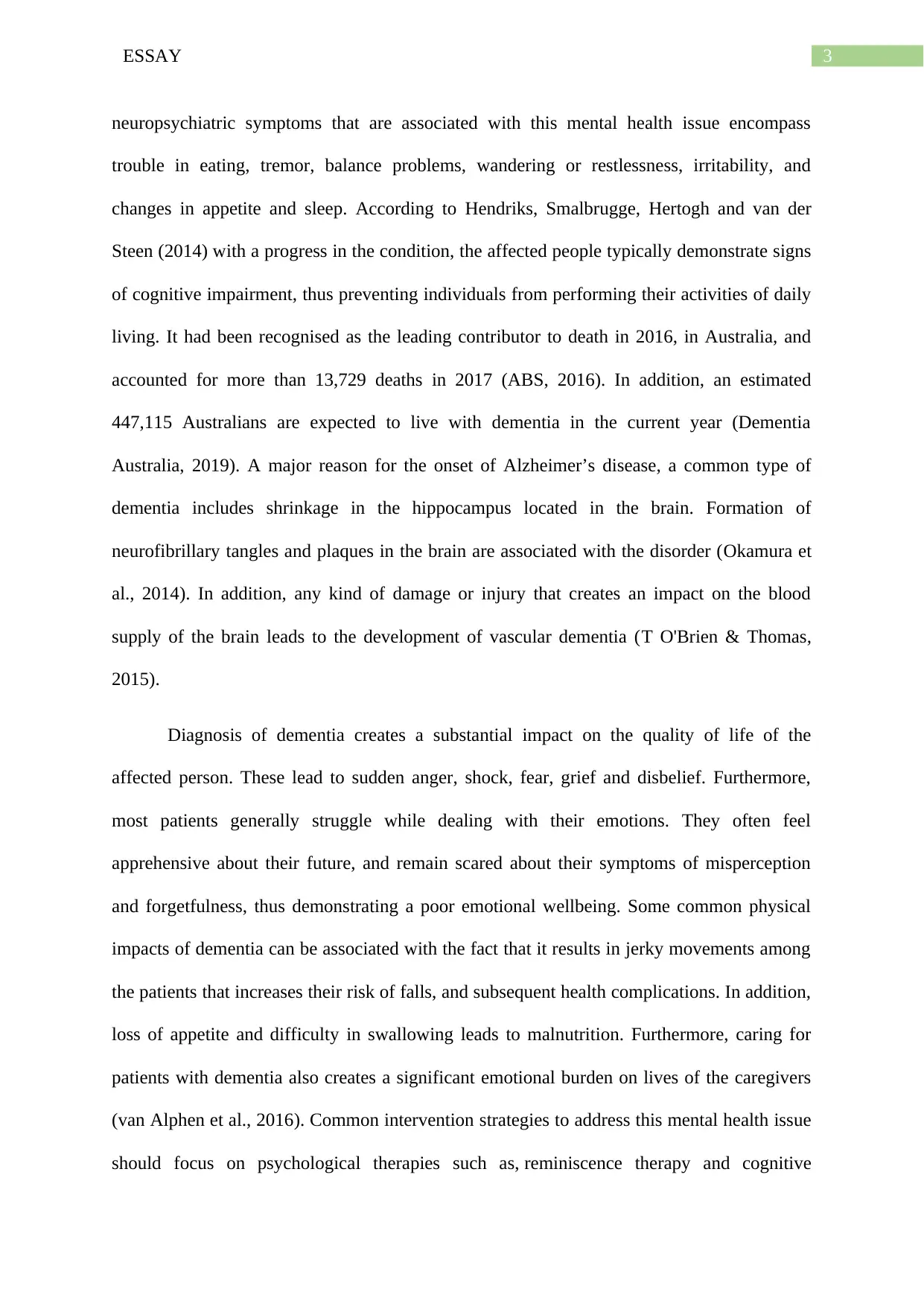
3ESSAY
neuropsychiatric symptoms that are associated with this mental health issue encompass
trouble in eating, tremor, balance problems, wandering or restlessness, irritability, and
changes in appetite and sleep. According to Hendriks, Smalbrugge, Hertogh and van der
Steen (2014) with a progress in the condition, the affected people typically demonstrate signs
of cognitive impairment, thus preventing individuals from performing their activities of daily
living. It had been recognised as the leading contributor to death in 2016, in Australia, and
accounted for more than 13,729 deaths in 2017 (ABS, 2016). In addition, an estimated
447,115 Australians are expected to live with dementia in the current year (Dementia
Australia, 2019). A major reason for the onset of Alzheimer’s disease, a common type of
dementia includes shrinkage in the hippocampus located in the brain. Formation of
neurofibrillary tangles and plaques in the brain are associated with the disorder (Okamura et
al., 2014). In addition, any kind of damage or injury that creates an impact on the blood
supply of the brain leads to the development of vascular dementia (T O'Brien & Thomas,
2015).
Diagnosis of dementia creates a substantial impact on the quality of life of the
affected person. These lead to sudden anger, shock, fear, grief and disbelief. Furthermore,
most patients generally struggle while dealing with their emotions. They often feel
apprehensive about their future, and remain scared about their symptoms of misperception
and forgetfulness, thus demonstrating a poor emotional wellbeing. Some common physical
impacts of dementia can be associated with the fact that it results in jerky movements among
the patients that increases their risk of falls, and subsequent health complications. In addition,
loss of appetite and difficulty in swallowing leads to malnutrition. Furthermore, caring for
patients with dementia also creates a significant emotional burden on lives of the caregivers
(van Alphen et al., 2016). Common intervention strategies to address this mental health issue
should focus on psychological therapies such as, reminiscence therapy and cognitive
neuropsychiatric symptoms that are associated with this mental health issue encompass
trouble in eating, tremor, balance problems, wandering or restlessness, irritability, and
changes in appetite and sleep. According to Hendriks, Smalbrugge, Hertogh and van der
Steen (2014) with a progress in the condition, the affected people typically demonstrate signs
of cognitive impairment, thus preventing individuals from performing their activities of daily
living. It had been recognised as the leading contributor to death in 2016, in Australia, and
accounted for more than 13,729 deaths in 2017 (ABS, 2016). In addition, an estimated
447,115 Australians are expected to live with dementia in the current year (Dementia
Australia, 2019). A major reason for the onset of Alzheimer’s disease, a common type of
dementia includes shrinkage in the hippocampus located in the brain. Formation of
neurofibrillary tangles and plaques in the brain are associated with the disorder (Okamura et
al., 2014). In addition, any kind of damage or injury that creates an impact on the blood
supply of the brain leads to the development of vascular dementia (T O'Brien & Thomas,
2015).
Diagnosis of dementia creates a substantial impact on the quality of life of the
affected person. These lead to sudden anger, shock, fear, grief and disbelief. Furthermore,
most patients generally struggle while dealing with their emotions. They often feel
apprehensive about their future, and remain scared about their symptoms of misperception
and forgetfulness, thus demonstrating a poor emotional wellbeing. Some common physical
impacts of dementia can be associated with the fact that it results in jerky movements among
the patients that increases their risk of falls, and subsequent health complications. In addition,
loss of appetite and difficulty in swallowing leads to malnutrition. Furthermore, caring for
patients with dementia also creates a significant emotional burden on lives of the caregivers
(van Alphen et al., 2016). Common intervention strategies to address this mental health issue
should focus on psychological therapies such as, reminiscence therapy and cognitive
Paraphrase This Document
Need a fresh take? Get an instant paraphrase of this document with our AI Paraphraser
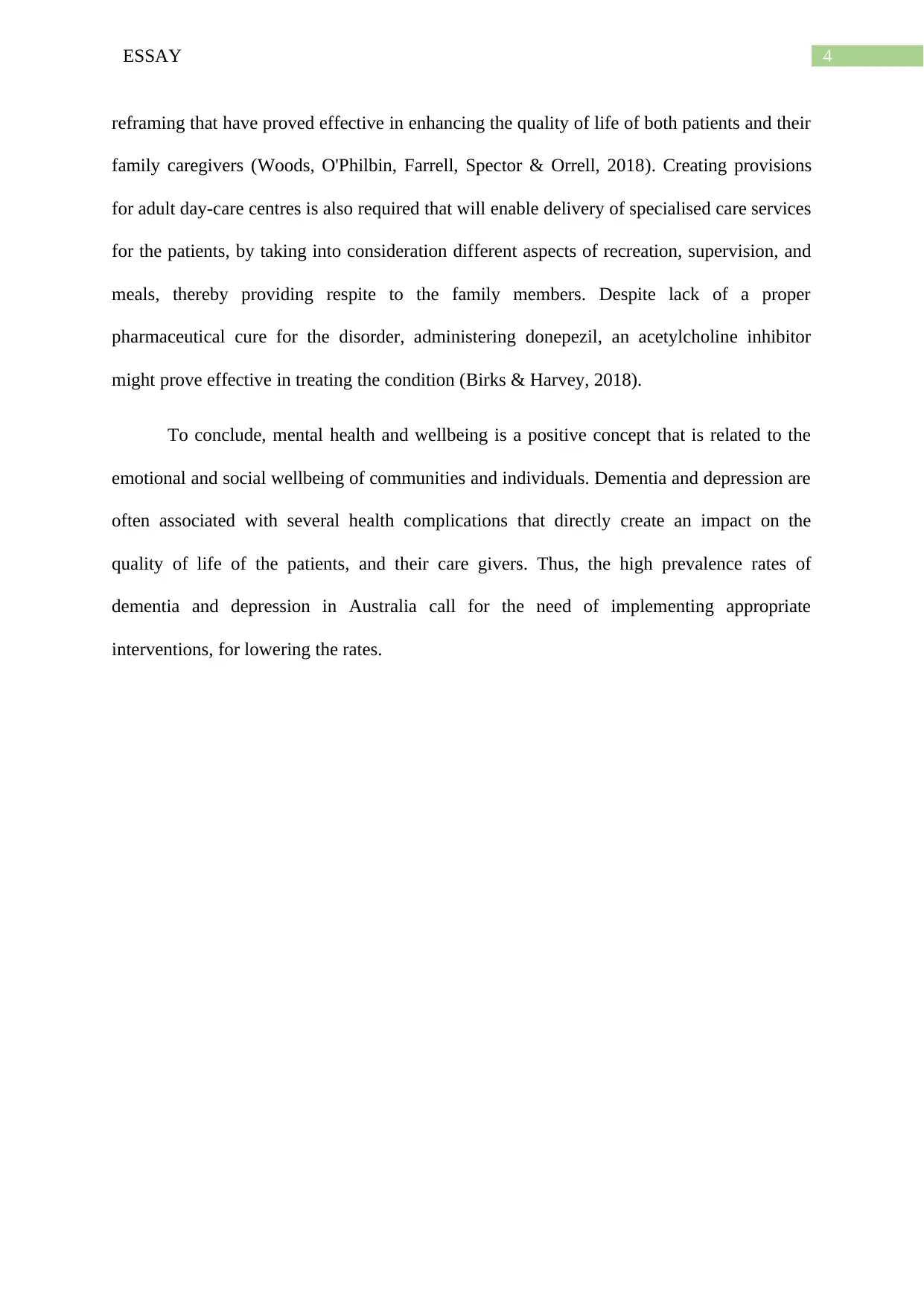
4ESSAY
reframing that have proved effective in enhancing the quality of life of both patients and their
family caregivers (Woods, O'Philbin, Farrell, Spector & Orrell, 2018). Creating provisions
for adult day-care centres is also required that will enable delivery of specialised care services
for the patients, by taking into consideration different aspects of recreation, supervision, and
meals, thereby providing respite to the family members. Despite lack of a proper
pharmaceutical cure for the disorder, administering donepezil, an acetylcholine inhibitor
might prove effective in treating the condition (Birks & Harvey, 2018).
To conclude, mental health and wellbeing is a positive concept that is related to the
emotional and social wellbeing of communities and individuals. Dementia and depression are
often associated with several health complications that directly create an impact on the
quality of life of the patients, and their care givers. Thus, the high prevalence rates of
dementia and depression in Australia call for the need of implementing appropriate
interventions, for lowering the rates.
reframing that have proved effective in enhancing the quality of life of both patients and their
family caregivers (Woods, O'Philbin, Farrell, Spector & Orrell, 2018). Creating provisions
for adult day-care centres is also required that will enable delivery of specialised care services
for the patients, by taking into consideration different aspects of recreation, supervision, and
meals, thereby providing respite to the family members. Despite lack of a proper
pharmaceutical cure for the disorder, administering donepezil, an acetylcholine inhibitor
might prove effective in treating the condition (Birks & Harvey, 2018).
To conclude, mental health and wellbeing is a positive concept that is related to the
emotional and social wellbeing of communities and individuals. Dementia and depression are
often associated with several health complications that directly create an impact on the
quality of life of the patients, and their care givers. Thus, the high prevalence rates of
dementia and depression in Australia call for the need of implementing appropriate
interventions, for lowering the rates.
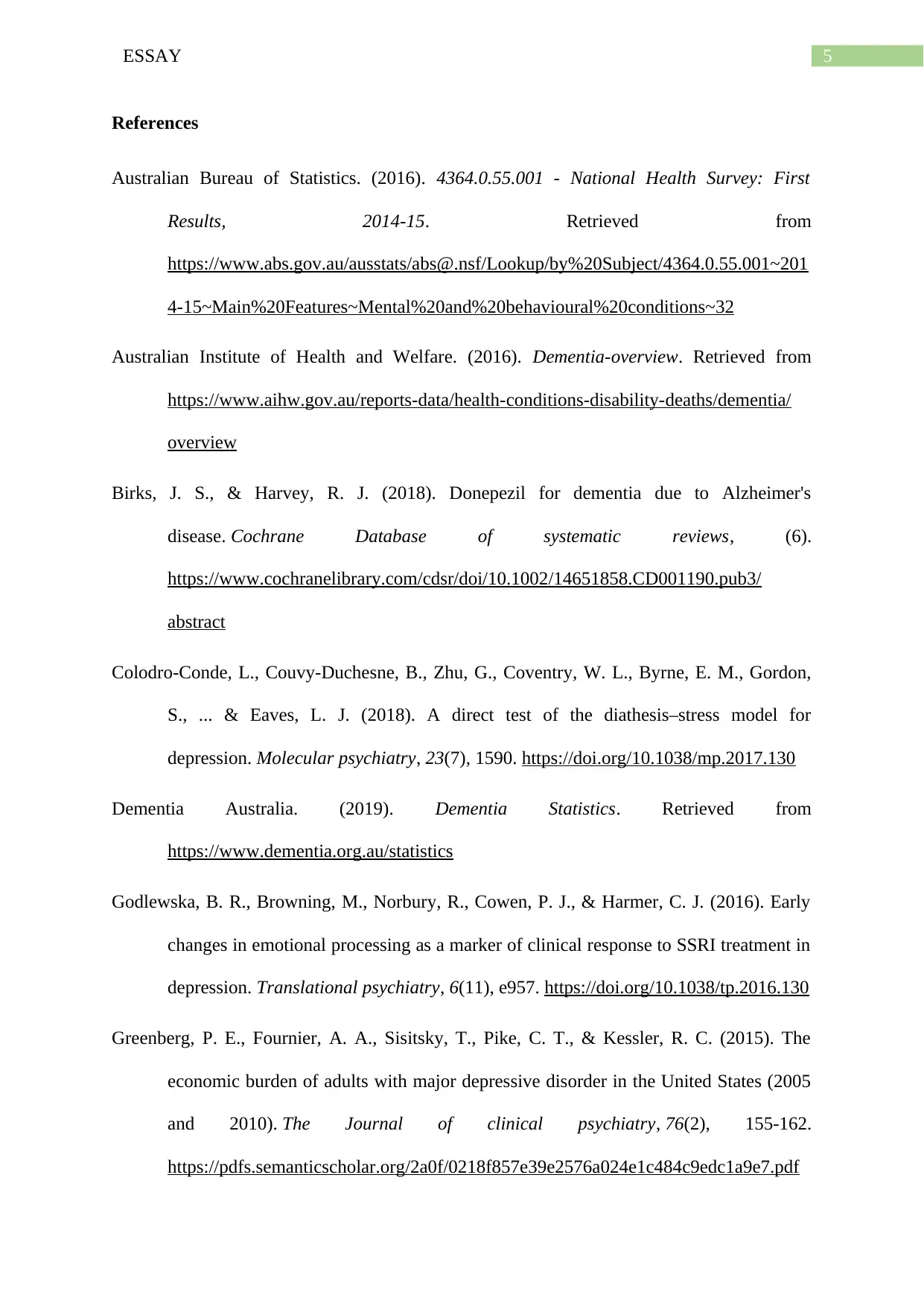
5ESSAY
References
Australian Bureau of Statistics. (2016). 4364.0.55.001 - National Health Survey: First
Results, 2014-15. Retrieved from
https://www.abs.gov.au/ausstats/abs@.nsf/Lookup/by%20Subject/4364.0.55.001~201
4-15~Main%20Features~Mental%20and%20behavioural%20conditions~32
Australian Institute of Health and Welfare. (2016). Dementia-overview. Retrieved from
https://www.aihw.gov.au/reports-data/health-conditions-disability-deaths/dementia/
overview
Birks, J. S., & Harvey, R. J. (2018). Donepezil for dementia due to Alzheimer's
disease. Cochrane Database of systematic reviews, (6).
https://www.cochranelibrary.com/cdsr/doi/10.1002/14651858.CD001190.pub3/
abstract
Colodro-Conde, L., Couvy-Duchesne, B., Zhu, G., Coventry, W. L., Byrne, E. M., Gordon,
S., ... & Eaves, L. J. (2018). A direct test of the diathesis–stress model for
depression. Molecular psychiatry, 23(7), 1590. https://doi.org/10.1038/mp.2017.130
Dementia Australia. (2019). Dementia Statistics. Retrieved from
https://www.dementia.org.au/statistics
Godlewska, B. R., Browning, M., Norbury, R., Cowen, P. J., & Harmer, C. J. (2016). Early
changes in emotional processing as a marker of clinical response to SSRI treatment in
depression. Translational psychiatry, 6(11), e957. https://doi.org/10.1038/tp.2016.130
Greenberg, P. E., Fournier, A. A., Sisitsky, T., Pike, C. T., & Kessler, R. C. (2015). The
economic burden of adults with major depressive disorder in the United States (2005
and 2010). The Journal of clinical psychiatry, 76(2), 155-162.
https://pdfs.semanticscholar.org/2a0f/0218f857e39e2576a024e1c484c9edc1a9e7.pdf
References
Australian Bureau of Statistics. (2016). 4364.0.55.001 - National Health Survey: First
Results, 2014-15. Retrieved from
https://www.abs.gov.au/ausstats/abs@.nsf/Lookup/by%20Subject/4364.0.55.001~201
4-15~Main%20Features~Mental%20and%20behavioural%20conditions~32
Australian Institute of Health and Welfare. (2016). Dementia-overview. Retrieved from
https://www.aihw.gov.au/reports-data/health-conditions-disability-deaths/dementia/
overview
Birks, J. S., & Harvey, R. J. (2018). Donepezil for dementia due to Alzheimer's
disease. Cochrane Database of systematic reviews, (6).
https://www.cochranelibrary.com/cdsr/doi/10.1002/14651858.CD001190.pub3/
abstract
Colodro-Conde, L., Couvy-Duchesne, B., Zhu, G., Coventry, W. L., Byrne, E. M., Gordon,
S., ... & Eaves, L. J. (2018). A direct test of the diathesis–stress model for
depression. Molecular psychiatry, 23(7), 1590. https://doi.org/10.1038/mp.2017.130
Dementia Australia. (2019). Dementia Statistics. Retrieved from
https://www.dementia.org.au/statistics
Godlewska, B. R., Browning, M., Norbury, R., Cowen, P. J., & Harmer, C. J. (2016). Early
changes in emotional processing as a marker of clinical response to SSRI treatment in
depression. Translational psychiatry, 6(11), e957. https://doi.org/10.1038/tp.2016.130
Greenberg, P. E., Fournier, A. A., Sisitsky, T., Pike, C. T., & Kessler, R. C. (2015). The
economic burden of adults with major depressive disorder in the United States (2005
and 2010). The Journal of clinical psychiatry, 76(2), 155-162.
https://pdfs.semanticscholar.org/2a0f/0218f857e39e2576a024e1c484c9edc1a9e7.pdf
⊘ This is a preview!⊘
Do you want full access?
Subscribe today to unlock all pages.

Trusted by 1+ million students worldwide
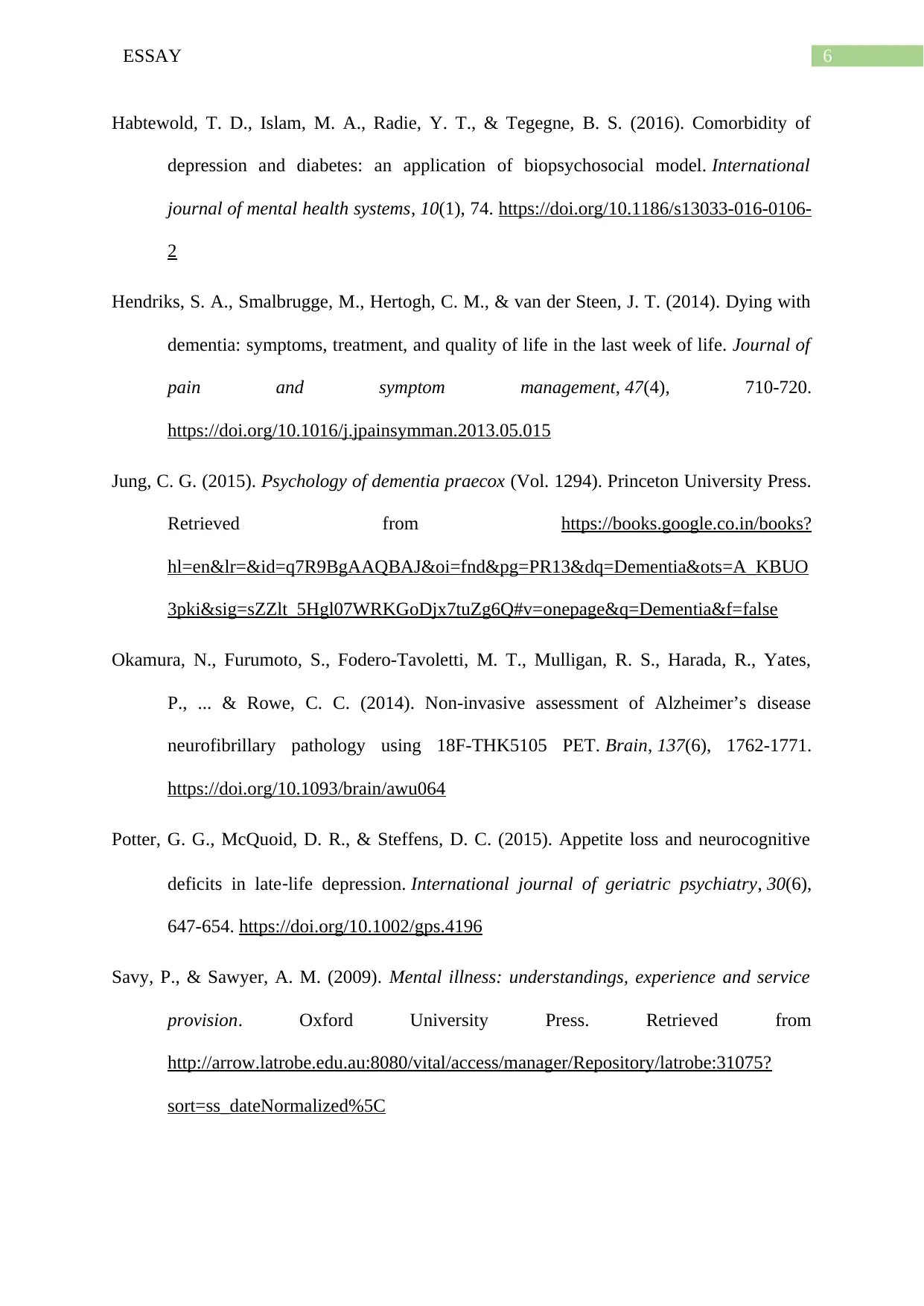
6ESSAY
Habtewold, T. D., Islam, M. A., Radie, Y. T., & Tegegne, B. S. (2016). Comorbidity of
depression and diabetes: an application of biopsychosocial model. International
journal of mental health systems, 10(1), 74. https://doi.org/10.1186/s13033-016-0106-
2
Hendriks, S. A., Smalbrugge, M., Hertogh, C. M., & van der Steen, J. T. (2014). Dying with
dementia: symptoms, treatment, and quality of life in the last week of life. Journal of
pain and symptom management, 47(4), 710-720.
https://doi.org/10.1016/j.jpainsymman.2013.05.015
Jung, C. G. (2015). Psychology of dementia praecox (Vol. 1294). Princeton University Press.
Retrieved from https://books.google.co.in/books?
hl=en&lr=&id=q7R9BgAAQBAJ&oi=fnd&pg=PR13&dq=Dementia&ots=A_KBUO
3pki&sig=sZZlt_5Hgl07WRKGoDjx7tuZg6Q#v=onepage&q=Dementia&f=false
Okamura, N., Furumoto, S., Fodero-Tavoletti, M. T., Mulligan, R. S., Harada, R., Yates,
P., ... & Rowe, C. C. (2014). Non-invasive assessment of Alzheimer’s disease
neurofibrillary pathology using 18F-THK5105 PET. Brain, 137(6), 1762-1771.
https://doi.org/10.1093/brain/awu064
Potter, G. G., McQuoid, D. R., & Steffens, D. C. (2015). Appetite loss and neurocognitive
deficits in late‐life depression. International journal of geriatric psychiatry, 30(6),
647-654. https://doi.org/10.1002/gps.4196
Savy, P., & Sawyer, A. M. (2009). Mental illness: understandings, experience and service
provision. Oxford University Press. Retrieved from
http://arrow.latrobe.edu.au:8080/vital/access/manager/Repository/latrobe:31075?
sort=ss_dateNormalized%5C
Habtewold, T. D., Islam, M. A., Radie, Y. T., & Tegegne, B. S. (2016). Comorbidity of
depression and diabetes: an application of biopsychosocial model. International
journal of mental health systems, 10(1), 74. https://doi.org/10.1186/s13033-016-0106-
2
Hendriks, S. A., Smalbrugge, M., Hertogh, C. M., & van der Steen, J. T. (2014). Dying with
dementia: symptoms, treatment, and quality of life in the last week of life. Journal of
pain and symptom management, 47(4), 710-720.
https://doi.org/10.1016/j.jpainsymman.2013.05.015
Jung, C. G. (2015). Psychology of dementia praecox (Vol. 1294). Princeton University Press.
Retrieved from https://books.google.co.in/books?
hl=en&lr=&id=q7R9BgAAQBAJ&oi=fnd&pg=PR13&dq=Dementia&ots=A_KBUO
3pki&sig=sZZlt_5Hgl07WRKGoDjx7tuZg6Q#v=onepage&q=Dementia&f=false
Okamura, N., Furumoto, S., Fodero-Tavoletti, M. T., Mulligan, R. S., Harada, R., Yates,
P., ... & Rowe, C. C. (2014). Non-invasive assessment of Alzheimer’s disease
neurofibrillary pathology using 18F-THK5105 PET. Brain, 137(6), 1762-1771.
https://doi.org/10.1093/brain/awu064
Potter, G. G., McQuoid, D. R., & Steffens, D. C. (2015). Appetite loss and neurocognitive
deficits in late‐life depression. International journal of geriatric psychiatry, 30(6),
647-654. https://doi.org/10.1002/gps.4196
Savy, P., & Sawyer, A. M. (2009). Mental illness: understandings, experience and service
provision. Oxford University Press. Retrieved from
http://arrow.latrobe.edu.au:8080/vital/access/manager/Repository/latrobe:31075?
sort=ss_dateNormalized%5C
Paraphrase This Document
Need a fresh take? Get an instant paraphrase of this document with our AI Paraphraser
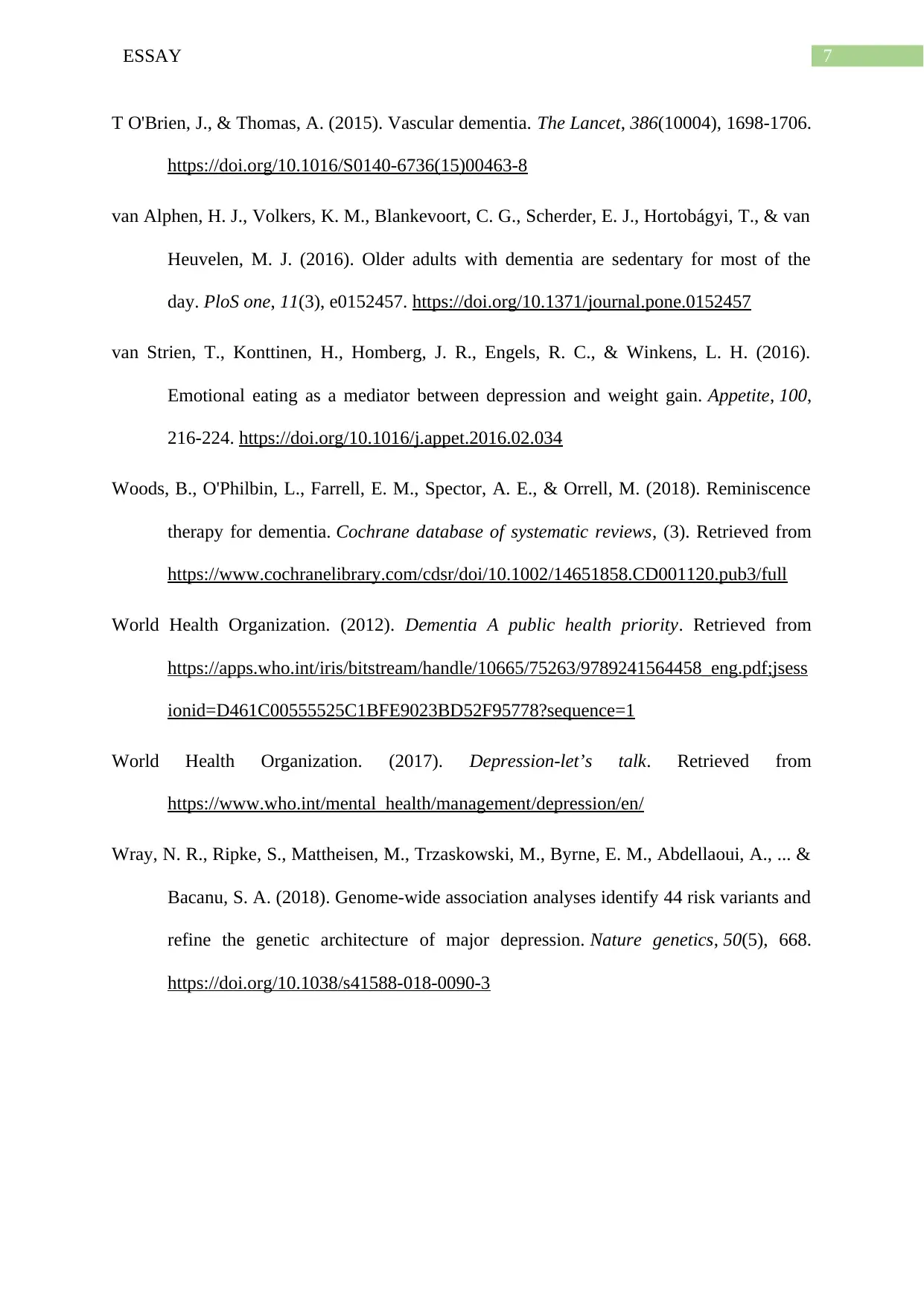
7ESSAY
T O'Brien, J., & Thomas, A. (2015). Vascular dementia. The Lancet, 386(10004), 1698-1706.
https://doi.org/10.1016/S0140-6736(15)00463-8
van Alphen, H. J., Volkers, K. M., Blankevoort, C. G., Scherder, E. J., Hortobágyi, T., & van
Heuvelen, M. J. (2016). Older adults with dementia are sedentary for most of the
day. PloS one, 11(3), e0152457. https://doi.org/10.1371/journal.pone.0152457
van Strien, T., Konttinen, H., Homberg, J. R., Engels, R. C., & Winkens, L. H. (2016).
Emotional eating as a mediator between depression and weight gain. Appetite, 100,
216-224. https://doi.org/10.1016/j.appet.2016.02.034
Woods, B., O'Philbin, L., Farrell, E. M., Spector, A. E., & Orrell, M. (2018). Reminiscence
therapy for dementia. Cochrane database of systematic reviews, (3). Retrieved from
https://www.cochranelibrary.com/cdsr/doi/10.1002/14651858.CD001120.pub3/full
World Health Organization. (2012). Dementia A public health priority. Retrieved from
https://apps.who.int/iris/bitstream/handle/10665/75263/9789241564458_eng.pdf;jsess
ionid=D461C00555525C1BFE9023BD52F95778?sequence=1
World Health Organization. (2017). Depression-let’s talk. Retrieved from
https://www.who.int/mental_health/management/depression/en/
Wray, N. R., Ripke, S., Mattheisen, M., Trzaskowski, M., Byrne, E. M., Abdellaoui, A., ... &
Bacanu, S. A. (2018). Genome-wide association analyses identify 44 risk variants and
refine the genetic architecture of major depression. Nature genetics, 50(5), 668.
https://doi.org/10.1038/s41588-018-0090-3
T O'Brien, J., & Thomas, A. (2015). Vascular dementia. The Lancet, 386(10004), 1698-1706.
https://doi.org/10.1016/S0140-6736(15)00463-8
van Alphen, H. J., Volkers, K. M., Blankevoort, C. G., Scherder, E. J., Hortobágyi, T., & van
Heuvelen, M. J. (2016). Older adults with dementia are sedentary for most of the
day. PloS one, 11(3), e0152457. https://doi.org/10.1371/journal.pone.0152457
van Strien, T., Konttinen, H., Homberg, J. R., Engels, R. C., & Winkens, L. H. (2016).
Emotional eating as a mediator between depression and weight gain. Appetite, 100,
216-224. https://doi.org/10.1016/j.appet.2016.02.034
Woods, B., O'Philbin, L., Farrell, E. M., Spector, A. E., & Orrell, M. (2018). Reminiscence
therapy for dementia. Cochrane database of systematic reviews, (3). Retrieved from
https://www.cochranelibrary.com/cdsr/doi/10.1002/14651858.CD001120.pub3/full
World Health Organization. (2012). Dementia A public health priority. Retrieved from
https://apps.who.int/iris/bitstream/handle/10665/75263/9789241564458_eng.pdf;jsess
ionid=D461C00555525C1BFE9023BD52F95778?sequence=1
World Health Organization. (2017). Depression-let’s talk. Retrieved from
https://www.who.int/mental_health/management/depression/en/
Wray, N. R., Ripke, S., Mattheisen, M., Trzaskowski, M., Byrne, E. M., Abdellaoui, A., ... &
Bacanu, S. A. (2018). Genome-wide association analyses identify 44 risk variants and
refine the genetic architecture of major depression. Nature genetics, 50(5), 668.
https://doi.org/10.1038/s41588-018-0090-3
1 out of 8
Related Documents
Your All-in-One AI-Powered Toolkit for Academic Success.
+13062052269
info@desklib.com
Available 24*7 on WhatsApp / Email
![[object Object]](/_next/static/media/star-bottom.7253800d.svg)
Unlock your academic potential
Copyright © 2020–2026 A2Z Services. All Rights Reserved. Developed and managed by ZUCOL.




